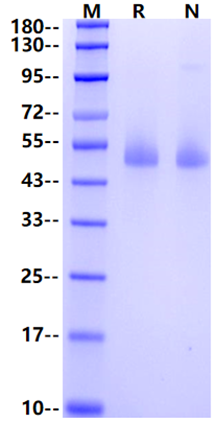Gln20-Pro418, with C-terminal 8*His
QNPASPPEEGSPDPDSTGALVEEEDPFFKVPVNKLAAAVSNFGYDLYRVRSSTSPTTNVLLSPLSVATALSALSLGAEQRTESIIHRALYYDLISSPDIHGTYKELLDTVTAPQKNLKSASRIVFEKKLRIKSSFVAPLEKSYGTRPRVLTGNPRLDLQEINNWVQAQMKGKLARSTKEIPDEISILLLGVAHFKGQWVTKFDSRKTSLEDFYLDEERTVRVPMMSDPKAVLRYGLDSDLSCKIAQLPLTGSMSIIFFLPLKVTQNLTLIEESLTSEFIHDIDRELKTVQAVLTVPKLKLSYEGEVTKSLQEMKLQSLFDSPDFSKITGKPIKLTQVEHRAGFEWNEDGAGTTPSPGLQPAHLTFPLDYHLNQPFIFVLRDTDTGALLFIGKILDPRGPGGGSHHHHHHHH
1.Published online 2022 Feb 15. doi: 10.1016/j.pep.2022.106072.
Human SERPINF1 gene codes for pigment epithelium-derived factor, a secreted glycoprotein and member of the SERPIN superfamily. Pigment epithelium-derived factor, also known as PEDF, Serpin F1, and SERPINF1, is a multiple functional protein that has both anti-angiogenic activity and neurotrophic activity at the same time.PEDF has affinity for PEDF-receptor (PEDF-R), a membrane-linked lipase encoded by the PNPLA2 gene.PEDF is also responsible for apoptosis of endothelial cells either through the p38 MAPK pathway or through the FAS/FASL pathway.PEDF has a variety of functions including antiangiogenic, antitumorigenic, and neurotrophic properties.
